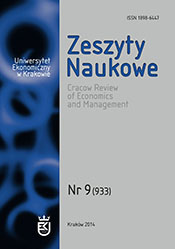The Importance of HRM in Creating Employee Innovativeness – The Mediating Role of Person-Organisation/Job Fit and Job Characteristics
The Importance of HRM in Creating Employee Innovativeness – The Mediating Role of Person-Organisation/Job Fit and Job Characteristics
Author(s): Agnieszka Wojtczuk-TurekSubject(s): Economy
Published by: Wydawnictwo Uniwersytetu Ekonomicznego w Krakowie
Keywords: HRM; innovativeness; person-organisation fit; person-job fit; job characteristics
Summary/Abstract: The purpose of the study presented in this article is to describe and explain the relationship between HRM practices and innovative behaviours initiated and performed by employees. In the model I propose, I use a “person-organisation fit” as a mediator of the relationship between HRM and creative activity in the workplace, and the influence the former has on the latter. The analysis also accounts for a variable which corresponds to person-organisation fit, and is defined as “job characteristics”. The research confirmed that a significant statistical relationship exists between innovative work behaviours and all of the variables examined: HRM practices, person-organisation fit and job characteristics/job demands. On the basis of the analysis with the use of structural equation model, it may be stated that the following factors influence innovative behaviours: 1) HRM practices (which have an indirect influence through person-organisation fit) and 2) person-organisation fit and job characteristics/job demands (which have a direct influence). The model explains the direct influence of HRM on person-organisation fit and job characteristics. The research shows that the “person-organisation fit” construct, as a variable explaining individual innovative effectiveness in the workplace, provides a useful perspective which may facilitate not only understanding of factors which determine the occurrence of organisational innovative activity, but also stimulate creative behaviours via HRM activities. This is because HRM practices play the key role both in adjusting competences to job characteristics and demands, and in creating attitudes which support employee innovative commitment. The combination of variables presented in the research model helps to explain the significance of chosen determinants of behaviours which are essential from the perspective of company effectiveness and competitiveness on the market. The research focuses on both individual aspects of innovative behaviors (resources which are needed to perform a creative task) and their organisational aspects (person-job/organisation fit). The scope of the analysis also covers the strategic role HR departments play.
Journal: Zeszyty Naukowe Uniwersytetu Ekonomicznego w Krakowie
- Issue Year: 933/2014
- Issue No: 09
- Page Range: 9-31
- Page Count: 23

